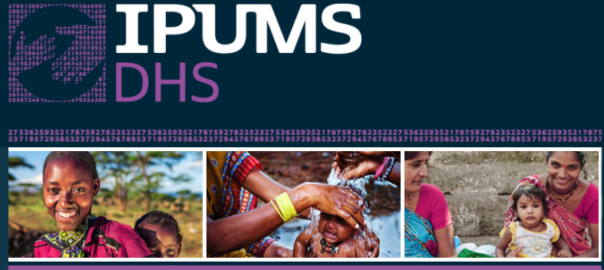IPUMS Announces Winners of the 2020 Global Health Research Awards

Every year, hundreds of papers are published using DHS Program data. Datasets for individual DHS surveys are available for download from The DHS Program website by completing a simple registration form. Researchers and students can also access the IPUMS DHS data collection to facilitate comparative analysis of DHS Program data. Harmonized across time and space, IPUMS DHS features consistently named and coded variables for 32 African countries and 9 Asian countries, with more datasets constantly being added.
The IPUMS DHS team recently announced the winners of this year’s IPUMS Global Health paper awards, which highlight some of the most exciting research to take advantage of the IPUMS DHS integrated datasets. These papers were selected from a highly competitive field that included nearly 50 studies released in 2020.
The Best IPUMS Global Health Publication Award goes to Zinguang Fan (Department of Sociology, Peking University, Beijing, China) and Maria Vignan Loria (Department of Sociology, University of Washington, Seattle, Washington, USA) for their Demographic Research article, “Intimate Partner Violence and Contraceptive Use in Developing Countries: How Does the Relationship Depend on Context?”
Fan and Loria resolve a puzzle in prior research on intimate partner violence (IPV): Why is the relationship between IPV and contraceptive use negative in some countries and positive in others? Using 30 IPUMS DHS samples from 17 countries, the authors demonstrate that the relationship between IPV and family planning is modified by macro contextual factors, including legal prohibitions and national levels of female empowerment. This study stands out not just for answering an important social science question but also in its creative use of the broad range of information collected in DHS Program surveys, including variables on contraceptive use and type, family size preferences, husband-wife disagreement on fertility goals, various indicators of women’s status (e.g., education, employment, decision-making), and domestic violence. In addition, the authors draw on IPUMS DHS variables to determine the direction of causality: from the experience of IPV to increased contraceptive use, rather than from contraceptive use to increased incidence of IPV.
The Best Student Paper Award goes to Siyu Heng (Graduate Group in Applied Mathematics and Computational Science, University of Pennsylvania, Philadelphia, Pennsylvania, USA) and his collaborators Wendy P. O’Meara, Ryan A. Simmons, and Dylan A. Small for their paper, “Relationship between Changing Malaria Burden and Low Birth Weight in sub-Saharan Africa.“
This study leverages geographic heterogeneity to determine the effect of reduced malaria burden on low-birth-weight rates across communities in 19 sub-Saharan African countries. Low birth weight is a serious health risk associated with cognitive and physical difficulties among children. This careful and cleverly designed study analyzes IPUMS DHS data from countries with at least two surveys and GPS data on survey cluster locations. After using optimal matching to pair DHS Program survey clusters separated in time, the authors use a difference-in-difference approach to compare the incidence of low birth weight in areas that did and did not experience malaria decline. Results reveal a substantial decline in low birth weight resulting from declines in malaria prevalence, especially for first-born children.
Congratulations to these scholars on this impressive accomplishment!
IPUMS DHS is a system that makes it easy to find and review thousands of DHS survey variables and to download a single fully harmonized data file with only the variables and samples that interest you. IPUMS DHS currently includes variables from DHS survey samples from 32 African and 9 Asian countries; more samples are constantly being added.
Special thanks to our guest blog contributors, Elizabeth Boyle and Miriam King!

Elizabeth Heger Boyle is Professor of Sociology & Law at the University of Minnesota. She studies the role of international laws and policies on women and children’s health around the world. She has written extensively on the impetus for and impact of laws related to female genital cutting, including the book Female Genital Cutting: Cultural Conflict in the Global Community. Her current research focuses on abortion policies globally and their effects; this includes a 2015 article in the American Journal of Sociology. Professor Boyle is currently co-Principal Investigator (with Dr. Miriam King) on IPUMS DHS, a National Institute of Child Health and Human Development grant that integrates Demographic and Health Surveys over time and across countries to make them more user-friendly for researchers. Professor Boyle has a Ph.D. in Sociology from Stanford University and a J.D. from the University of Iowa.

Miriam L. King is a Senior Research Scientist at the Institute for Social Research and Data Innovation at the University of Minnesota. She has managed data integration projects on the U.S. Current Population Survey, the U.S. National Health Interview Survey, and, most recently, the Demographic and Health Surveys. Her research has focused on the history of the U.S. census, data integration methods, U.S. historical fertility differences, living arrangements, and disparities in access to insurance for same-sex couples. Dr. King has a Ph.D. jointly in Demography and History from the University of Pennsylvania.

